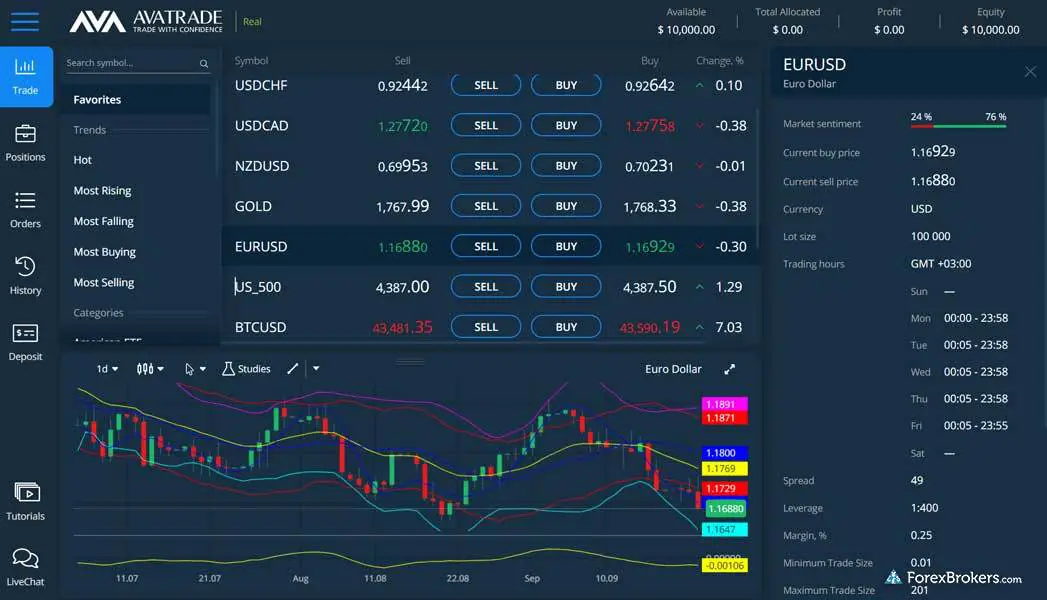Table of Contents
With time advancement, many investment options are available where you can invest your money and make profits. An investment method is considered good when there is less risk of money and high return rates, but it isn’t easy to find an investment option. So, in this article, you will learn about two of the best investment methods: forex and futures. Many experienced investors prefer these two investment options.

Forex vs. Futures Day Trading
The difference between forex day traders and futures day traders is that the futures contract is an agreement between a buyer and seller to buy or sell a particular asset at a given price on a specified date. On the other hand, forex is buying or selling a currency against another country’s currency. Spot forex traders, on the other hand, are limited to the currency market alone. However, CFD forex traders can trade various instruments such as currencies, indices, stocks, commodities, etc., the same as futures traders.
Now, the big question that comes to everyone’s mind is, which is the better investment option? Well, it depends on an individual’s budget and what type of trader he is.
If you have a low budget, forex trading is best because it requires less investment than futures. If you want to know more, below is a detailed explanation of forex and futures day trading. So, without wasting time, let’s jump into the main deal.
Forex Trading
Forex, foreign exchange trading, is the world’s biggest currency market. Simply put, it is a decentralized global market where all the currencies of different countries, or all the world’s currencies, trade. Foreign exchange trading started in 1875 and is also considered an important event. The good thing about forex trading is that you can use a demo account if you are new to learning more about it.
The first purpose of a demo account is to provide general information to beginners and help them better understand the market’s concepts. The second purpose is that if anyone wants to try new strategies, demo accounts are beneficial to avoid loss. The third purpose is that a demo account can help identify a broker’s services before trying them.
Though a demo account can give you some idea, it is ineffective. If you want to gain some experience, micro-trading is the perfect option. It only requires $100$ to sign up and start trading. This is advantageous for forex trading because brokers in futures demand heavy deposits of around $10,000$ to start.
When examining investment options, futures and forex trading present unique opportunities and challenges. Each market caters to different types of traders based on their resources, trading style, and risk tolerance. Here, we will explore both in detail, including the advantages and disadvantages of each trading method.
Forex Trading
Forex, or foreign exchange market, involves the trading of currencies and is the world’s largest and most liquid market. Key benefits and drawbacks include:
Pros of Forex Trading
- Leverage: Forex markets provide significant leverage, often as high as 100:1. This means traders can control prominent positions with a relatively small capital, enhancing profit potentials from small price movements.
- More Opportunities: The forex market operates 24 hours a day during weekdays, providing constant trading opportunities. This accessibility is ideal for those who prefer to trade flexibly, including part-time traders.
- Liquidity: Due to its vast trading volume, the forex market offers high liquidity, making it easy to enter and exit positions. The high liquidity also generally results in lower transaction costs, such as spreads and commissions.
Cons of Forex Trading
- High Risk from Leverage: While leverage can magnify profits, it also increases the potential for significant losses, particularly if the market moves against the trader’s position.
- Market Volatility: Forex markets can experience sudden and sharp movements due to economic reports, political events, or market sentiment shifts. This volatility can make it challenging to maintain profitable strategies.
- Complex Price Determination: Currency prices can be influenced by numerous factors, including economic indicators, political conditions, and market sentiment, making it complex to predict price movements accurately.
Futures Trading
Futures involve agreements to buy or sell assets at a predetermined price at a future date. These assets could be commodities like gold or oil, financial instruments, or indices.

Pros of Futures Trading
- Risk Management: Futures are primarily used for hedging risk in various markets. By locking in prices, traders can protect their portfolios against price fluctuations.
- Potential for Quick Profits: Experienced traders with a robust market understanding can leverage futures to capitalize on price movements more swiftly than in other markets.
- Market Efficiency: Futures markets are considered highly efficient due to their structure and regulation, which helps facilitate fair trading practices.
Cons of Futures Trading
- Leverage Risks: Like forex, the leverage in futures trading can lead to significant losses and gains.
- Time Constraints: Futures contracts have expiration dates, which can pressure traders to close positions, possibly at less-than-ideal market prices.
- Competitive and Complex: Futures markets can be intimidating for beginners or small traders due to the presence of major institutional investors and the complexity of the products traded.
Comparative Analysis
While both forex and futures offer high leverage and the potential for significant profits, they cater to different trading styles. Forex trading provides more flexible trading hours and higher liquidity, which is suitable for those who desire constant market access and have a firm grasp of macroeconomic factors.
On the other hand, futures trading is often preferred by traders looking to hedge risk or speculate on the price movements of commodities and other physical assets. The structured nature of futures contracts provides clarity and security regarding trade agreements, which is less pronounced in the more speculative forex market.
Both markets require a thorough understanding of market forces, a clear strategy, and an acceptance of the risks involved, particularly those associated with high leverage. Traders should consider their financial goals, risk tolerance, and trading experience before deciding which market is better suited to their needs.
Conclusion
Forex and futures have pros and cons, and if you are planning to invest your money, it is essential to plan and research everything properly. Also, before entering any platform, make sure to educate yourself and gain as much knowledge as you can. Many investors use both platforms, and you must identify your needs before entering any platform.
One way to increase your profitability chances is to get an experienced mentor who can share real-life examples and tips. You must also be patient because it will take some time to understand the market better.
























